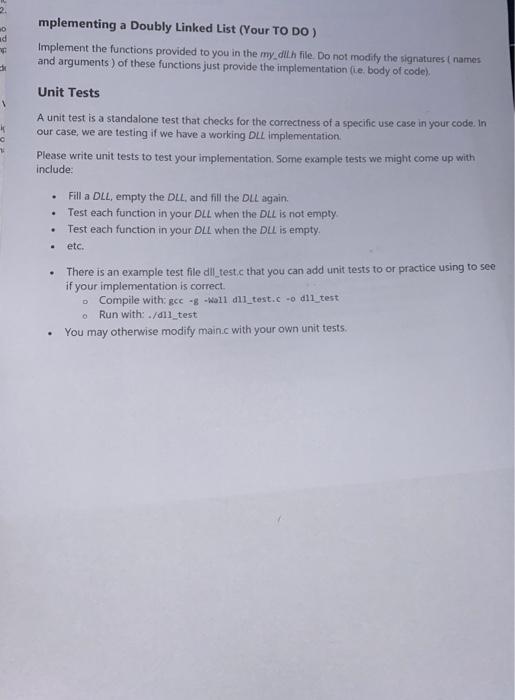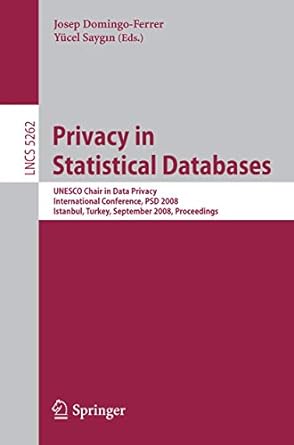Question
please help me to implement a doubly linked list using following instructions and functions. // Doubly Linked List ( DLL ). // // // //
// Doubly Linked List ( DLL ).
//
//
//
// - Implement each of the functions to create a working DLL.
// - Do not change any of the function declarations
// - (i.e. dll_t* create_dll() should not have additional arguments)
// - You should not have any 'printf' statements in your DLL functions.
// - (You may consider using these printf statements to debug, but they should be removed from your final version)
// - (You may write helper functions to help you debug your code such as print_list etc)
// ==================================================
#ifndef MYDLL_H
#define MYDLL_H
// Create a node data structure to store data within
// our DLL. In our case, we will stores 'integers'
typedef struct node{
int data;
struct node* next;
struct node* previous;
}node_t;
// Create a DLL data structure
// Our DLL holds a pointer to the first node in our DLL called head,
// and a pointer to the last node in our DLL called tail.
typedef struct DLL{
int count; // count keeps track of how many items are in the DLL.
node_t* head; // head points to the first node in our DLL.
node_t * tail; //tail points to the last node in our DLL.
}dll_t;
// Creates a DLL
// Returns a pointer to a newly created DLL.
// The DLL should be initialized with data on the heap.
// (Think about what the means in terms of memory allocation)
// The DLLs fields should also be initialized to default values.
// Returns NULL if we could not allocate memory.
dll_t* create_dll(){
// Modify the body of this function as needed.
}
// DLL Empty
// Check if the DLL is empty
// Returns 1 if true (The DLL is completely empty)
// Returns 0 if false (the DLL has at least one element enqueued)
// Returns -1 if the dll is NULL.
int dll_empty(dll_t* l){
}
// push a new item to the front of the DLL ( before the first node in the list).
// Returns 1 on success
// Returns 0 on failure ( i.e. we couldn't allocate memory for the new node)
// Returns -1 if DLL is NULL.
// (i.e. the memory allocation for a new node failed).
int dll_push_front(dll_t* l, int item){
}
// push a new item to the end of the DLL (after the last node in the list).
// Returns 1 on success
// Returns 0 on failure ( i.e. we couldn't allocate memory for the new node)
// Returns -1 if DLL is NULL.
// (i.e. the memory allocation for a new node failed).
int dll_push_back(dll_t* l, int item){
}
// Returns the first item in the DLL and also removes it from the list.
// Returns 0 on failure, i.e. there is noting to pop from the list.
// Returns a -1 if the DLL is NULL.
// Assume no negative numbers in the list or the number zero.
int dll_pop_front(dll_t* t){
}
// Returns the last item in the DLL, and also removes it from the list.
// Returns 0 on failure, i.e. there is noting to pop from the list.
// Returns a -1 if the DLL is NULL.
// Assume no negative numbers in the list or the number zero.
int dll_pop_back(dll_t* t){
}
// Inserts a new node before the node at the specified position.
// Returns 1 on success
// Retruns 0 on failure:
// * we couldn't allocate memory for the new node
// * we tried to insert at a negative location.
// * we tried to insert past the size of the list
// (inserting at the size should be equivalent as calling push_back).
// Returns -1 if the list is NULL
int dll_insert(dll_t* l, int pos, int item){
}
// Returns the item at position pos starting at 0 ( 0 being the first item )
// (does not remove the item)
// Retruns 0 on failure:
// * we tried to get at a negative location.
// * we tried to get past the size of the list
// Returns -1 if the list is NULL
// Assume no negative numbers in the list or the number zero.
int dll_get(dll_t* l, int pos){
}
// Removes the item at position pos starting at 0 ( 0 being the first item )
// Retruns 0 on failure:
// * we tried to remove at a negative location.
// * we tried to remove get past the size of the list
// Returns -1 if the list is NULL
// Assume no negative numbers in the list or the number zero.
int dll_remove(dll_t* l, int pos){
}
// DLL Size
// Queries the current size of a DLL
// Returns -1 if the DLL is NULL.
int dll_size(dll_t* t){
}
// Free DLL
// Removes a DLL and all of its elements from memory.
// This should be called before the proram terminates.
void free_dll(dll_t* t){
}
#endif

Step by Step Solution
There are 3 Steps involved in it
Step: 1

Get Instant Access to Expert-Tailored Solutions
See step-by-step solutions with expert insights and AI powered tools for academic success
Step: 2

Step: 3

Ace Your Homework with AI
Get the answers you need in no time with our AI-driven, step-by-step assistance
Get Started


